- Home
- Diana Wynne Jones
Conrad's Fate Page 8
Conrad's Fate Read online
Page 8
Christopher marched smartly out of the room and marched smartly in again almost at once with Mr. Smithers, who behaved as if Christopher had dragged him there by his coat collar. Gregor looked daggers at Christopher. And honestly, that was one of a good many times that I didn’t blame Gregor. Christopher was so pleased with himself. When he looked like that, I usually wanted to hit him as much as Gregor did.
Mr. Smithers was in trouble with the Countess. She had an awful way of opening her ice blue eyes wide, wide, and saying in a sweet, cold, cooing voice, “Explain yourself, Smithers. Why is this so?” Or sometimes she just said, “Why?” which was worse.
Poor Mr. Smithers snuffled and shifted and tried to explain. It was about some part of her money that was late coming in. We had to stand there and listen while he tried.
And it was odd. It was all quite ordinary stuff, like the income from the home farms and the inn she owned in Stallstead and her property in Ludwich. I kept thinking of Uncle Alfred telling me about Stallery’s worldwide dealings and the huge markets that needed the possibilities pulled to work them, and I began to wonder if Uncle Alfred had got this right. He had told me about millions on the stock exchange, and here was the Countess asking about sixties and eighties and hundreds. I was really confused. But then I thought it had to be the Count who dealt in the big money. Someone had to. You only had to look at Stallery to see it cost a bomb to run the place.
But I didn’t have much time to think. Mrs. Baldock rang for us the moment the Countess had polished off Mr. Smithers and her breakfast. Christopher and I had to pelt off to the Housekeeper’s Room. By the time we got there, Mrs. Baldock was pacing about among her pretty floral chairs and little twiddly tables. The purple bits down the sides of her face were almost violet with impatience.
“I can only spare you five minutes,” she said. “I have to be at my daily conference with the Countess after this. There’s just time to outline the nature of your training to you now. We aim, you see, to ensure that whichever of you attains the post of valet to the Count is completely versed in all aspects of domestic science. You’ll be learning, first and foremost, the correct care of clothing and the correct fashion for everything a gentleman does. Proper clothes for fishing are just as important as evening dress, you know, and there are six types of formal evening wear....”
She went on about clothes for a good minute. I couldn’t help thinking that the Count would have had to hire a lorry when he went to Ludwich if he really did take all the clothes Mrs. Baldock said he needed. I watched her feet tramping about on the floral carpet. She had huge ankles that draped over the sides of her buckled shoes.
“But just as important are laundering, housecleaning, and bed making,” she said. “And in order to learn to care for your gentleman in every way, you’ll be having courses on flower arranging, haircutting, and cookery, too. Do either of you cook?”
While I was saying, “Yes, ma’am,” I had the briefest glimpse of absolute horror on Christopher’s face. Then he somehow managed a beguiling smile. “No,” he said. “And I couldn’t arrange flowers if my life depended on it. It’s beginning to look as if Conrad’s going to be the next valet, isn’t it?”
“The Count will shortly marry,” Mrs. Baldock pointed out. “The Countess is insisting on it. By the time his son is of an age to require a valet, even you should have learned what is necessary.” She gave Christopher one of her long, expressionless looks.
“But why cooking?” he said despairingly.
“It is the custom,” Mrs. Baldock said, “for the Count’s son to be sent to university accompanied by both his tutor and his valet. They will take lodgings together, and the valet will create their meals.”
“I’d far rather create a meal than cook one,” Christopher told her frankly.
Mrs. Baldock actually grinned. She seemed to have taken to Christopher. “Get along with you!” she said. “I can see well enough that you can do anything you set your mind to, young man. Now go and report to the Upper Laundrymaid and tell her I sent you both.”
We blundered our way through the stone warren of the undercroft and finally found the laundry. There the woman in charge looked at us doubtfully, then straightened our neckcloths, and then stood back to see if this had changed her opinion of us. She sighed. “I’ll start you on ironing,” she said pessimistically. “Things that don’t matter too much. Paula! Take these two to the pressing room, and show them what to do.”
Paula materialized out of the steam and took us in tow, but unfortunately, she turned out to be no good at explaining things. She showed us to a bare stone room with various sizes of ironing tables in it. She gave Christopher a damp linen sheet and me a pile of wettish neckcloths. She told us how to turn the irons on. Then she left.
We looked at each other. Christopher said, “Penny for them, Grant.”
“It’s a bit like,” I said, “that story where they had to turn straw into gold.”
“It is!” Christopher agreed. “And no Rumpelstiltskin to help.” He pushed his iron experimentally across the sheet. “This makes no difference—or possibly more wrinkles than before.”
“You have to wait for the iron to get hot,” I said. “I think.”
Christopher lifted the iron and turned it this way and that in front of his face. “A touch of warmth now,” he said. “How do these things work anyway? They don’t plug in. Is there a salamander inside, or something?”
I laughed. Christopher’s ignorance was truly amazing. Fancy thinking a fire lizard could heat an iron! “They have a power unit inside—just like lights and cookers and tellies do.”
“Do they? Oh!” said Christopher. “A little light came on at the end of this iron!”
“That may mean it’s hot enough,” I said. “Mine’s got a light now. Let’s try.”
We got going. My first idea—that you could save time and effort by doing ten neckcloths at once—didn’t seem to work. I cut the pile down to five, to two, and then to just one, which promptly turned yellowish and smelled. Christopher kept muttering, “I don’t seem to be living up to Mrs. Baldock’s high opinion of me—not at all!” until he startled me by crying out, “Great heavens! A church window! Look!”
I looked. He had a dark brown iron shape burned into the middle of his sheet.
“I wonder if it will do that again,” he said.
He tried, and it did. I watched, fascinated, while Christopher printed a whole row of church windows right across the sheet. Then he went on to make a daisy shape in the lower half of it.
But at this point I was recalled to my own work by a cloud of black smoke and a very strong smell. I looked down to find that my iron had burned a neckcloth right in two and then gone on to burn its way into the ironing table beneath. I had a very deep black church window there. I found red cinders in it when I snatched the iron up.
“Oh, help!” I said.
“Panic ye not, Grant,” Christopher said.
“I can’t help it!” I said, trying to fan away rolls of brown smoke. “We’re going to get into awful trouble.”
“Only if things stay like this,” Christopher said. He came across and looked at my disaster. “Grant,” he said, “this is too deep for a church window. What you have here is probably a dugout canoe.” He switched his own iron off and wagged it in my face. “I congratulate you,” he said.
I nearly screamed at him. “It’s not funny!”
“Yes, it is,” he said. “Look.”
I looked, and I gaped. The smoke had gone. The black boat shape was not there anymore. The ironing table was flat and complete, with its brown-blotched surface quite smooth, and on top of it lay a plain, white, badly ironed neckcloth. “How …?” I said.
“No questions,” Christopher said. “I shall just get rid of my own artwork.” He picked up a corner of his ruined sheet and shook it. And all the church windows simply disappeared. He turned to me, looking very serious. “Grant,” he said, “you didn’t see me do this. Promise me you didn’t, or yo
ur dugout canoe comes back deeper and blacker and smokier than ever.”
I looked from him to the restored ironing table. “If I promise,” I said, “can I ask you how you did it?”
“No,” he said. “Just promise.”
“All right. I promise,” I said. “It’s obvious anyway. You’re a magician.”
“A magician,” Christopher said, “is someone who sets out ritual candles round a pentangle and then mutters words of power. Did you see me do that?”
“No,” I said. “You must be a very advanced kind.”
Then I was half frightened, half pleased, because I thought I had made Christopher annoyed enough to tell me about himself. “Piffle! Pigheaded piffle!” he began. “Grant—”
To my great disappointment, Miss Semple hurried in and interrupted him. “You have to stop this now, boys,” she said. “Make sure the irons are switched off. Mr. Avenloch has just brought in the produce for today, and Mr. Maxim wants you to start your cookery course by learning to pick out the best.”
So off we hurried once more, to a chilly stone storeroom that opened off the yard, where Mr. Avenloch was standing watching a gang of lower gardeners carry in baskets of fruit and boxes of vegetables. One of the gang was the boy with the handmade boots. He grinned at us, and we grinned back, but I didn’t envy him. Mr. Avenloch was one of those tall, thin, eagle-faced types. He looked a total tyrant.
“Wipe that smile off your face, Smedley,” he said, “and get you gone back to that hoeing.”
When the whole gang had gone scurrying out again, Mr. Maxim pranced forward. He was almost as full of himself as Christopher was. He was Second Underchef and he had been given the extra responsibility of teaching us, and this had made him really cocky. He rubbed his hands eagerly together and said to Christopher, “You are choosing for the table of the Countess herself. Pick me out—by sight only—all the best vegetables for her.”
From the look on Christopher’s face, I was fairly sure he had never seen a raw vegetable in his life before this. But he made a confident pounce toward a basket of gooseberries. “Here,” he said, “are some splendid peas, really big ones. Oh no, they’re hairy. It can’t be good for peas to have bristles, can it?”
“Those,” Mr. Maxim said, “are gooseberries for the Stillroom. Try again.”
A little more cautiously, Christopher approached a small box of bright red chilies. “Now here are some fine, glossy carrots,” he suggested. “They probably fade a bit when you cook them.” He looked at Mr. Maxim. Mr. Maxim nearly dislodged his tall white hat by clutching at his head. “No?” Christopher asked. “What are they then? Pipless strawberries? Long, thin cherries?”
By this time I was leaning against the wall bent over with laughter. Mr. Maxim rounded on me. “This is no joke!” he shouted. “He’s winding me up, isn’t he?”
I could see he was furious. Cocky people hate being made fun of. I shook my head and managed to pull myself together. “No, he’s not,” I said. “He really doesn’t know. He—you see—he’s lived all his life as heir to a great estate—a bit like Stallery, really—but the family fell on hard times, and he had to get a job.” I looked sideways at Christopher. He put on a modest look and did not try to deny what I said. Interesting.
Mr. Maxim was instantly sorry for Christopher. “My dear boy,” he said, “I quite understand. Please go round with Conrad and let him identify the produce for you.” He was wonderfully kind to Christopher after that and even quite kind to me when I mistook a pawpaw for a vegetable marrow.
“Thanks,” Christopher murmured to me while we were arranging the fruit I had chosen in a great cut glass bowl. “I owe you one, Grant.”
“No, you don’t,” I whispered back. “Dugout canoe.”
But he did end up owing me one later that day. This was after we had stood against the wall in yet another eating room, each of us with a useless white cloth draped over one arm, watching the Countess and Lady Felice eat lunch. Part of the meal was actually the bowl of fruit we had arranged that morning. This gave me a good feeling, as if I had really done something at last. The Countess attacked the fruit heartily, but Lady Felice took one grape, and that was all.
“Darling,” said the Countess, “you’ve hardly eaten anything. Why?”
It was the bad “Why?” with the stare. Lady Felice looked at her plate in order not to meet the stare and muttered that she wasn’t hungry. This did not satisfy the Countess at all. She went on and on about it. Was Felice ill? Should she call a doctor? What were the symptoms? Or had breakfast disagreed with her? All in the sweet, high voice.
In the end Lady Felice said, “I just don’t feel like food, Mother. All right?” Her face went pink, and she almost glared at the Countess.
And the Countess said, “There’s no need to be coy, dear. If you’re trying to lose weight, you’re welcome to borrow my pills.”
Christopher’s eyes went sideways and met mine. She does take spell pills! his look said. Both of us nearly burst, trying not to laugh. Mr. Amos shot us a dirty look. So did Gregor. And by the time we had a grip on ourselves, Lady Felice had flung down her napkin and rushed out of the room, leaving the Countess looking annoyed and mystified.
“Amos,” she said, “I shall never understand the young.”
“Naturally not, my lady,” Mr. Amos replied.
She smiled graciously, folded her napkin neatly, and walked elegantly to the door. “Tell Smithers to come to my boudoir with his revised accounts,” she said as she left.
For some reason—I think it was watching her walk—I remembered Mrs. Potts saying that the Countess used to kick up her legs in a chorus line. I was staring after her, trying so hard to imagine her doing it—and I couldn’t—that I jumped a mile when Mr. Amos shouted at me. He was really angry. He planted himself on the carpet face-to-face with us, and he told us off thoroughly for daring to laugh in front of the Ladies. He made me at least feel awful. It didn’t seem to matter that he was the same height as I was and inches shorter than Christopher. He was like a prophet or a saint or something, hating us for being ungodly and thundering out of heaven at us.
“Now you will learn to be mannerly,” he said in the end. “Both of you are to go out of this door and come in again as softly and politely as you can. Go on.”
Even Christopher was quite cowed by then. We crept to the double door, crept out into the hall, and tiptoed apologetically in again. And of course that was not right. Mr. Amos made us do it over and over again, while Gregor kept shooting us mean smiles as he cleared the lunch away. We must have gone in and out fifty times, and Mr. Amos was just promising us that we would go on doing it until we got it right, when one of the other footmen came to say that Mr. Amos was wanted on the telephone.
“What a relief!” Christopher muttered.
“Gregor,” said Mr. Amos, “set these two to cleaning the silver until we Serve Tea. If this is the call I was expecting, I shall be busy all afternoon, so you are to make sure they keep at it.” And he hurried away on his small, shiny feet.
“I spoke too soon,” Christopher said as Gregor came toward us.
“This way. Hurry up,” Gregor said. He was positively gloating. Among his other drawbacks, Gregor was big. Hefty. He had the meaty sort of hands you could rather easily imagine giving you a wallop on the ear. We scuttled after him without a word, with our three sets of feet ringing, clack-clack-clack, around the hall. He led us through the green cloth door and along the wood-and-stone passage to a room right at the end, where there was a long table covered with newspapers. “Right,” Gregor said. “Aprons behind the door. Roll your sleeves up. Here are the rags, and this is the polish. Get going.” He whipped the newspaper away. “I shall be back to check,” he said, “and I need to see my face in all this when I do.”
He left us staring at two deep boxes of cutlery, silver teapots, silver coffeepots, several jugs, ladles, and two rows of the huge silver plates, all laid out on more newspaper. Rearing behind those were bowls, tureens, urns,
and complicated twiddly candlesticks, most of them enormous.
“Straw into gold again, Grant,” Christopher said, “and I think that would be easier.”
“Most of it’s quite shiny already,” I said. “Look on the bright side.”
“I hate bright sides,” said Christopher.
But we knew Gregor would love to catch us slacking, and we got to work. I let Christopher rub on the pink, strong-smelling polish—because that was the easy part, and I was fairly sure that cleaning silver was another thing Christopher had never done before—while I took a pile of rags and rubbed and rubbed. After a while I got into the swing of it and began to read the newspapers under the silver and to think of other things. The cleaning room must have been next door to Mr. Amos’s pantry. I could hear his voice as I worked, droning on in blasts and occasionally giving out a sort of booming bark, but I couldn’t hear the words, just his voice. It got me down.
I mentioned this to Christopher. He sighed.
I made several other remarks to Christopher, and he did not answer any of them. I turned and looked at him. He was drooping over the table, panting a bit, and his face was almost the gray and white color of the newspaper on the table. He had turned his neckcloth back to front in order not to get polish on it, and I noticed that there was a gold chain with a ring threaded on it hanging out of his shirt. It kept tinking on the candlestick he was working on because he was all bowed over.
I remembered a boy called Hamish at my school who could never do Art because the paints gave him asthma. It looked as if something the same was wrong with Christopher. “What’s the matter? Is the polish making you ill?”
Christopher put the candlestick down and held himself up with both hands on the table. “Not the polish,” he said. “The silver. There’s something about Series Seven that makes it worse than usual. I don’t think I can go on, Grant.”

 Fire and Hemlock
Fire and Hemlock Reflections: On the Magic of Writing
Reflections: On the Magic of Writing The Game
The Game The Crown of Dalemark
The Crown of Dalemark Deep Secret
Deep Secret Witch Week
Witch Week Year of the Griffin
Year of the Griffin Wild Robert
Wild Robert Earwig and the Witch
Earwig and the Witch Witch's Business
Witch's Business Dogsbody
Dogsbody Caribbean Cruising
Caribbean Cruising Cart and Cwidder
Cart and Cwidder Conrad's Fate
Conrad's Fate Howl's Moving Castle
Howl's Moving Castle The Spellcoats
The Spellcoats The Pinhoe Egg
The Pinhoe Egg Drowned Ammet
Drowned Ammet The Ogre Downstairs
The Ogre Downstairs Dark Lord of Derkholm
Dark Lord of Derkholm Castle in the Air
Castle in the Air The Magicians of Caprona
The Magicians of Caprona A Tale of Time City
A Tale of Time City The Lives of Christopher Chant
The Lives of Christopher Chant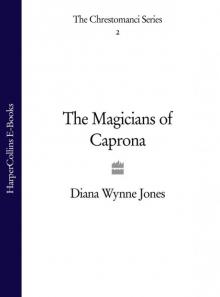 The Magicians of Caprona (UK)
The Magicians of Caprona (UK)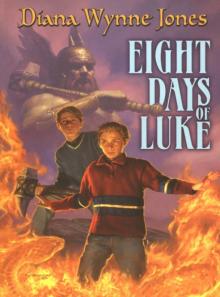 Eight Days of Luke
Eight Days of Luke Conrad's Fate (UK)
Conrad's Fate (UK) A Sudden Wild Magic
A Sudden Wild Magic Mixed Magics (UK)
Mixed Magics (UK) House of Many Ways
House of Many Ways Witch Week (UK)
Witch Week (UK)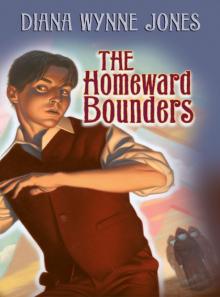 The Homeward Bounders
The Homeward Bounders The Merlin Conspiracy
The Merlin Conspiracy The Pinhoe Egg (UK)
The Pinhoe Egg (UK) The Time of the Ghost
The Time of the Ghost Hexwood
Hexwood Enchanted Glass
Enchanted Glass The Crown of Dalemark (UK)
The Crown of Dalemark (UK) Power of Three
Power of Three Charmed Life (UK)
Charmed Life (UK) Black Maria
Black Maria The Islands of Chaldea
The Islands of Chaldea Cart and Cwidder (UK)
Cart and Cwidder (UK) Drowned Ammet (UK)
Drowned Ammet (UK) Charmed Life
Charmed Life The Spellcoats (UK)
The Spellcoats (UK)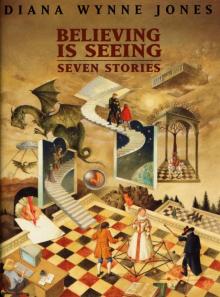 Believing Is Seeing
Believing Is Seeing Samantha's Diary
Samantha's Diary Aunt Maria
Aunt Maria Vile Visitors
Vile Visitors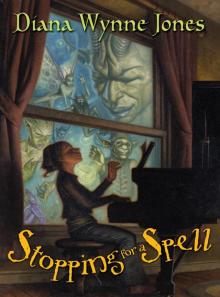 Stopping for a Spell
Stopping for a Spell Freaky Families
Freaky Families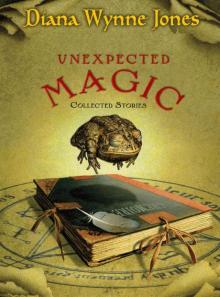 Unexpected Magic
Unexpected Magic Reflections
Reflections Enna Hittms
Enna Hittms Mixed Magics: Four Tales of Chrestomanci
Mixed Magics: Four Tales of Chrestomanci